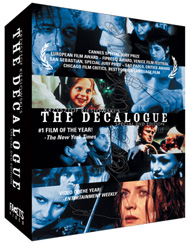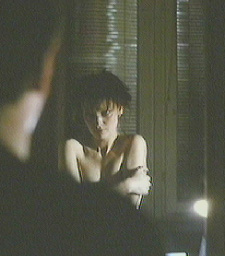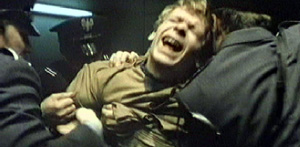| Release List | Reviews | Price Search | Shop | Newsletter | Forum | DVD Giveaways | Blu-Ray/ HD DVD | Advertise |
| Reviews & Columns |
|
Reviews DVD TV on DVD Blu-ray International DVDs Theatrical Reviews by Studio Video Games Features Collector Series DVDs Easter Egg Database Interviews DVD Talk TV DVD Talk Radio Feature Articles Columns Anime Talk DVD Savant HD Talk Horror DVDs Silent DVD
|
DVD Talk Forum |
|
|
| Resources |
|
DVD Price Search Customer Service #'s RCE Info Links |
|
Columns
|
 |
The Decalogue |

|
The Decalogue Facets Video 1987 / Color / 1:37 / 584 minutes (10 episodes) / Street Date August 19, 2003 / 79.95 Starring (see IMDB link for a raft of very Polish names of very talented actors.) Cinematography Witold Adamek, Jacek Blawut, Slavomir Idziak, Andrzej Jaroszewicz, Edward Klosinski, Dariusz Kuc, Krzysztof Pakulski, Piotr Sobocinski, Wieslaw Zdort Production Designer Halina Dobrowolska Film Editor Ewa Smal Original Music Zbigniew Preisner Writing credits Krzysztof Kieslowski and Krzysztof Piesiewicz Produced by Ryszard Chutkowski Directed by Krzysztof Kieslowski |
Three years ago, Image and Facets Video released a two-disc set of this ten-hour Polish miniseries, without extras and packed into two double-sided, double-layer discs. It quickly became a coveted collectors' item before disappearing. Now Facets is back with a remastered reissue, spreading the same material over three single-sided, double-layer discs, with a number of extras. (see below)
Krzysztof Kieslowski was one of the most popular art film directors of the 90's, and his ten-hour miniseries, originally produced for Polish televison, was one of the most desirable hard-to-see titles of the decade. Dekalog could only be seen in infrequent museum showings, because sitting through ten hours of dramas in two five-hour stints was not a very practical idea.
Critical response to Dekalog has only been a little more enthusiastic than the reaction of Kieslowski's cinematic peers. The most useful quote is from Stanley Kubrick, whose plug is on the Dekalog box. In his book Eyes Wide Open, Frederick Raphael reported that, while discussing Eyes Wide Shut, Kubrick said the Dekalog was the best thing he'd seen in years ... and he wished he had made it himself.
Kieslowski's mini-series is unlike anything Stanley Kubrick has made. Or anyone else, for that matter.

Dekalog is (are?) ten modest one-hour dramatic shows, each of which uses an intimate human drama or crisis to illustrate one of the Ten Commandments. Illustrate is not the right word; I purposely watched the shows without reading anything about them beforehand, and in some cases found it very hard to guess which Commandment went with which episode. Inside the shows, the references are fairly well hidden. No Commandments are mentioned in the onscreen titles. But Polish viewers were probably informed which Commandment was being dramatized because everything I have read about Dekalog discusses them openly.
Although some of the characters acknowledge concern about the role of God in their problems, the shows are definitely not about religion per se. Neither is there a wrap-up moral at the end of each episode. The subjects touched on are familiar ones: infidelity, jealousy, capital punishment, abortion, voyeurism, obsession, even incest. The focus in each case is on the individuals involved, not the issue, which is usually left an open question.
The shows examine interpersonal problems that evoke moral and ethical dilemmas. For basic honesty, these problems seem light-years beyond those posed in American Movies of the Week (or Academy Award winning Hollywood films, for that matter). Some set up highly dramatic situations, others are resolved without the participants breaking a sweat ... on the outside.
If someone starts telling you the plot of a Dekalog episode, cover your ears and run. Savant scrupulously avoided reading plot summaries and am very glad I did not .... which is why story synopses do not appear here.
Only a couple of the shows betray anything remotely resembling standard drama format. Some don't even begin or end at predictable points. The people in each episode grab your attention immediately; as you try to understand their problems, concern for them builds quickly. The level of acting here is phenomenal, and even the children on view are extremely well-chosen. Since everyone is an unfamiliar human face (at least to we here in the States), the feeling of becoming intimately involved with real people is unusually strong. The reaction is not, 'Gee, those actors are really good," but instead, "I know these people." Which is presumably the aim of drama in the first place. At least seven out of ten episodes transported this reviewer all the way to that goal.
All of the stories take place in and around a particularly drab Warsaw housing complex. Although characters from one episode can occasionally be glimpsed in another, each show is self-contained. When a familiar face wanders into a later scene (usually at the elevators), you practically jump out of your chair ... and realize how much you care about them. You know you are watching good drama when 'characters in someone's script' take on living properties. And then there is that one mysterious person who is never a main character but keeps appearing in the strangest ... well, that's too much said already.
The key may be in Dekalog 8, where the situation of Dekalog 2 is suddenly recapped, as a real event everyone in Warsaw has apparently read about. In evaluating the story, a professor urges students to see it through the eyes of the participants, as they are individuals, not just 'types' - the doctor, the wife, the husband, the lover. The strength of Dekalog is that it does just this; its people are so vividly particularized. This is not arthouse reality ... characters don't stand around in artful compositions, the director expressing themes with visuals more powerful than the actors. This isn't Minnelli or Antonioni or even Bergman (who comes off as thickly mannered compared to Kieslowski).
Each story seems just long enough to develop a single idea. How many movies that you are 'supposed to see,' have you avoided because their subject matter just never interested you enough to invest the time and effort to see them? 1 Savant often ends up watching only part of a movie, until work or sleep or something else breaks it up. No problem with that here. Val Lewton had the right idea with his seventy-minute features.
The Dekalog is not cinema - verite. The episodes are very definitely Written and Directed .... little tangential observances are constantly happening, that comment on the story being told. A few are crude (an impotent man using the gas pump at a service station), but most pass before you realize their full pertinence. For example, at one point an intense classroom discussion on human decency is interrupted by the entrance of a doddering, mentally-impaired person, who is brusquely shown the door and hustled outside. Then the class goes back to its 'sensitive' work. Writers Kieslowski and Piesiewicz also use symbols ... but only when the characters notice them too. When one woman sees a man carrying a (ah-ah, no spoilers), just like she had seen at an earlier moment of crisis, she herself is struck by the the apparent 'meaning' of the moment. And isn't that the unusually familiar man from the previous episodes, where he also walked through at the strangest times? Although ordinary exposition sneaks in from time to time, we most often discover the backgrounds of the characters through interpersonal clues and hints. This works perfectly, as it is the same method by which we judge and understand the people we meet and observe in our daily lives.
Pan Kieslowski and Piesiewicz 's style steers a very adept course between art cinema and soap opera. Some of the episodes are quite different-looking. A story taking place at Christmas time is very bright and slick. Another is drab and grainy. Another chapter is color-filtered in ugly yellows and greens, to strange effect, almost like Lars Von Trier's Breaking the Waves.
Since the stories are more interested in presenting human problems than in wrapping them up in neat resolutions, viewers needing everything spelled out for them might be disappointed. That doesn't mean empty endings or resolutions where people contemplate blank walls for minutes on end. These are all very accessible dramas. And, finally, because The Dekalog is from Poland and not PC-conscious Hollywood, there will be people who reject some of the tales because their 'messages' can be interpreted as conservative or old-fashioned. 2 None of the characters carries the burden of representing anything but their own consciousness ... none are perfect, and none conform to 'appropriate' stereotypes.
The world of Dekalog is Warsaw, where people seem to be getting along just as many do here, living in simple apartments, dealing with their lives in less than lavish surroundings. It is refreshing to see stories with characters not completely bound up by typical American problems - ambition, money, success. Hollywood has a hard time when trying to tell stories that place the personal traumas of people above their economic status. The poor are usually treated with condescendsion. Rich people's problems seem minor compared to their lavish on-screen lifestyles, which many viewers resent. How does one get worked up over the problems of movie celebrities, no matter what's happening to them? They'll just be on ET tomorrow, talking about how tough it is to be a superstar.
The truth is that in most commercial films, the real subject is consumerism itself. Americans still go to see the big stars, and they want to watch people save the world or strike a blow for freedom, not deal with problems like the mortgage. Effects and pace and sensation are the key elements now. I know intelligent people for whom the appeal of movies are the clothes and the hairstyles! No wonder Hollywood 'upscales' most of what it touches. 'Style' most often means a veneer of affluence. Nobody complains that everyone in Heat, even police detectives and bookstore clerks, lives in lavish hillside homes with plate glass panoramas of Los Angeles. We're still selling a fantasy that doesn't wash, but that everyone wants to see. Even PBS has become so commercialized, it is more likely to import a sensational British teleseries, over something as low-key as The Dekalog.
So maybe the issue that makes Dekalog so honest is money. This show comes off as so simple and basic ... there's nothing to make into a network promo, no nudity, no violence, no cheap thrills. There's nothing to Sell as we know how to sell it.3
Since Dekalog is so humbly unique, so different from anything Savant has seen before, it isn't the kind of show to recommend to everyone. And one's reaction to it is bound to be too personal for me to tell anyone how they are going to react. All I know for sure is that each hour of viewing in our house has been followed by at least ten minutes of intense discussion, of both the shows and the issues raised therein ... for Savant and family, these shows were a revelation.

The earlier DVD limited release of The Decalogue from Image was a good-looking encoding of reasonable transfers of these (originally 16mm?) Polish television shows. Facets Video is now its own distributor, and they've made some changes in the presentation for this new release. ( note: Since this review came out, readers have informed me that the two- disc set was replaced by the three disc version during the initial sales run of the disc - something Facets didn't tell me. So if you already have a 3-disc set of The Decalogue, it may already be identical to this one.)
The transfers appear to be the same. Savant sampled two episodes on both releases, and found the new version to have an edge on quality, with a little less grain and better compression on some moving scenes. But the show still looks as rough as ever, so don't expect any amazing improvement. For all intents and purposes, the quality is the same or a bit better, spread over three sides instead of four, three discs instead of two.
This new set contains some extras. On disc one, Roger Ebert weighs in with some background and personal thoughts about the shows, that will be a big help to those uninitiated into the world of Kieslowski. Disc three has several short shows from Polish television, all overdubbed with a droning English voice instead of subtitled. There's a short interview on the set with the director, and a longer interview with a room-ful of sober film students. A retrospective screening of his work after his 1996 death has testimony from his various collaborators, and there's an interview with screenwriter Krysztof Piesiewicz. Some of these are subtitled. The package mentions a booklet with full credits, that wasn't in the boxed set I received.
It was Savant's personal choice to avoid reading the box text, which gives too much information, including a teaser description of each show's premise. The only unfortunate choice with the disc presentation is that the menus to initiate each episode show with onscreen chapter titles, that you must consciously avoid looking at to keep surprises from being ruined - this is really regrettable. Otherwise the package gets top marks across the board.
On a scale of Excellent, Good, Fair, and Poor, The Decalogue rates:
Movie: Excellent
Video: Good
Sound: Good
Supplements: Roger Ebert interview, short interviews and docs from Polish television
Packaging: Three snapper cases in card box
Reviewed: July 22, 2003
Footnotes:
1 Most of the real classics Savant has seen, he was forcefed in college. I'm glad they foisted Diary of a Country Priest on me, but didn't go out of my way to catch every Rohmer or Clement or Rossellini ever made. I always used to have the excuse of pre-video unavailability to justify not seeking out Ozus and Bressons and the like. Now I have to admit I don't want to see everything. When these titles came out on laser, I rented stuff like Master of the World instead. With no apologies. To each his own.
2 Like the people who condemned Atame! (Tie Me Up, Tie Me Down) for being about a woman kidnapped and raped, who subsequently falls in love with her captor. As un-PC as it is, it does deal with a culturally suppressed fact - some people seem to need to be dominated by others. Why else would so many women, cultural and religious motives aside, stay married to abusive husbands?
3 I'm suddenly aware that I chose images for the page too quickly ... the 'nudity' in the first overstates the erotic content of the series ... and the situation in the second is not at all typical ... well, no single image can represent the series well anyway. Perhaps it was a subliminal attempt to hype the disc, as I do when I cut movie promos. Savant is just another flawed type at odds with personal Commandments, I suppose.
Review Staff | About DVD Talk | Newsletter Subscribe | Join DVD Talk Forum
Copyright © MH Sub I, LLC dba Internet Brands. | Privacy Policy | Terms of Use
|
| Release List | Reviews | Price Search | Shop | SUBSCRIBE | Forum | DVD Giveaways | Blu-Ray/ HD DVD | Advertise |





